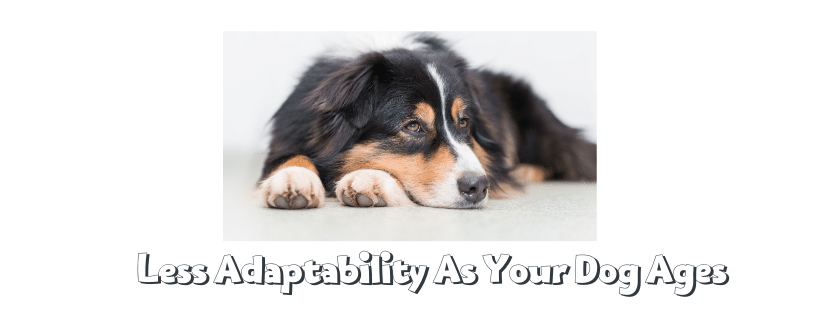Less Adaptability As Your Dog Ages
It is not uncommon to find the older dog less adaptable to changes in diet, routine, or environment. For example, my dog always loved riding in the car, bouncing about with a sense of excitement. He never missed a thing that passed by; now that he is older he prefers to lie quietly on the seat snuggled up against me or else on the floor. He may even get an occasional upset stomach and throw up while riding. And he steps in and out of the car with considerably greater care!
In the past, it never seemed to bother him if I occasionally got home late for his supper. He’d jovially greet me at the door with little more than a “Hey, what’s up?” and race you for the food dish. Now I find that he has thrown up small amounts of yellowish-green stomach fluid due to the increased acidity of a stomach which contains no food.
I have found that leaving a small amount of dry food when I go out may solve this upset. Speaking of stomach upset, whenever I had parties, he always joined in the fun and most of the time survived the party foods given him by my well-meaning guests. Now he shows less interest in the goings-on, preferring to be by himself in a quieter part of the house. If he does indulge in any party food, he almost always has some digestive disturbance.
Rare Diseases That Strike The Aging Dog
Fortunately, the aging dog has relatively few disorders of the brain and spinal cord associated with the process of growing old. Arteriosclerosis, that bane of human aging and a primary cause of senility, is quite rare in dogs. Hence it is unusual indeed to meet a truly senile dog.
Cerebral hemorrhage, also called apoplexy or stroke, is likewise a very infrequent occurrence in the canine. Rabies is caused by a virus which is attracted specifically to nerve tissue and is transmitted by the bite of a rabid animal. However, there have also been rare reports in recent years of airborne transmission. It has been traditionally believed for centuries that once symptoms of rabies develop, death is inescapable, and because of the hazard to other animals and people, such dogs are euthanized if they have not yet bitten anyone.
Recent reports of two human rabies cases that were treated successfully and survived the development of rabid symptoms, if confirmed, may possibly alter the present grim outlook for rabid dogs. With the extremely effective and safe vaccines available today to protect your aging dog, however, there is no excuse for you to ever have to worry about this disease.
Question and Answers: Part 4
How old should a bitch be when weaning her last litter? In general, a female should not be more than five years old when weaning her last litter, nor younger than the second heat, which means between one and two years old. She should also be bred only every other heat, which means a total of three or four litters throughout a female’s lifetime.
How old should a male dog be before he should be prevented from copulating? Dogs generally have a self-checking mechanism, which means that they would not ordinarily pursue sex beyond their abilities and fortitude. If they did attempt copulation beyond their physical stamina, they would simply pass out. As dogs get older, they have a lower sperm count, so for selective breeding purposes, you are better off using a younger dog with not only fine conformation but stable temperament as well.
Do female dogs experience a change in life? Not that we are aware of. Female dogs can remain fertile until they die. We know of a cocker spaniel who had puppies at the age of fourteen. For the most part, females simply stop coming into heat, or come into heat less often, without any menopausal symptoms such as hot flashes, etc.
What is the oldest a dog can live? We have heard of dogs living to eighteen years. In general, these cases occur among the smaller breeds.
How does a dog’s hearing or sight change as he gets older? It generally gets worse. Barring any medical problems, it is not uncommon to see normal longevity of nine to fifteen years in a dog that has become deaf. The older dog will lose his hearing gradually so that his owner is often not aware of it until the dog is deaf or almost deaf. Dogs very rarely become blind, but many will experience a clouding of the lens as they get older. A dog’s sight is comprised of rods but no cones, so they don’t see color – only shades of black, white, and gray.
Do older dogs tend to get fat? Dogs, in general, tend to be overfed. They are being killed with kindness through frequent snacking. However, older dogs, like people, will tend to lose muscle tone. Overfeeding and lack of exercise will cause any age dog to become overweight.
How common is the problem of gastric torsion? It seems to occur primarily in big dogs. The condition usually is precipitated by a heavy, fatty meal, eaten hastily, followed closely ‘by a lot of water then by exercise. The stomach is contracting, trying to digest food and building up fermentation momentum until, in the big-chested dog, the stomach literally flips over, twists, and closes off the openings at both ends. It can be remedied only by immediate surgery to unflip the stomach and sew it to the stomach wall if necessary. If not caught in time, the dog goes into shock and dies.


